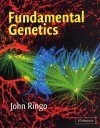![Fundamental Genetics Fundamental Genetics]()
Click to have a closer look
About this book
Contents
Customer reviews
Related titles
About this book
Fundamental Genetics is a concise, non-traditional textbook that explains major topics of modern genetics in 42 mini-chapters. It is designed as a textbook for an introductory general genetics course and is also a useful reference or refresher on basic genetics for professionals and students in health sciences and biological sciences. It is organized for ease of learning, beginning with molecular structures and progressing through molecular processes to population genetics and evolution. Students will find the short, focused chapters approachable and more easily digested than the long, more complex chapters of traditional genetics textbooks. Each chapter focuses on one topic, so that teachers and students can readily tailor Fundamental Genetics to their needs by choosing a subset of chapters. Fundamental Genetics is extensively illustrated throughout with clear and uncluttered diagrams that are simple enough to be reproduced by students. This unique textbook provides a compact alternative for introductory genetics courses.
Contents
1. Life forms and their origins
2. Nucleic acids
3. Proteins
4. Simple chromosomes
5. Chromosomes of eukarya
6. Genome content
7. RNA synthesis I: Transcription
8. RNA synthesis II: Processing
9. Abundance of RNAs in bacteria
10. Abundance of RNAs in eukarya
11. Protein synthesis
12. DNA replication
13. Chromosome replication
14. Molecular events of recombination
15. Micromutations
16. Repair of altered DNA
17. Reproduction of bacteria
18. Horizontal gene transfer in bacteria
19. Cell cycles of eukarya
20. Meiosis
21. Chromosomal abnormalities
22. Life cycles of eukarya
23. Reproduction of viruses
24. Genetic processes in development
25. Sex determination and dosage compensation
26. Cancer
27. Cutting, sorting, and copying DNA
28. Genotyping by DNA analysis
29. Genetically engineered organisms
30. Genomics
31. Behavior of genes and alleles
32. Probability and statistics toolkit
33. Genes, environment, and interactions
34. Locating genes
35. Finding and detecting mutations
36. Cytoplasmic inheritance
37. Genetic variation in populations
38. Mutation, migration, and genetic drift
39. Natural selection
40. Quantitative genetics
41. Speciation
42. Molecular evolution and phylogeny
Glossary
Customer Reviews



































